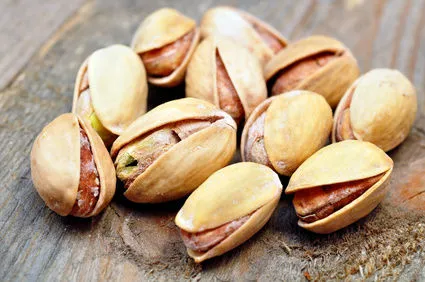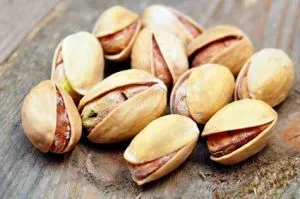
- Share on Facebook104
- Share on Pinterest
- Share on Twitter
It should come as no surprise that nuts are a healthy addition to a balanced diet. Copious amounts of research involving major cohort studies over the years have linked nut consumption with a decreased risk of heart disease.
Researchers recently found a connection between avid nut-eaters and reduced instances of pancreatic cancer, the fourth most common cause of cancer-related death. While all nuts provide a wealth of nutrients, pistachios add a particularly powerful punch when it comes to health benefits.
Pistachios provide close to six grams of protein and nearly three grams of fiber in a one-ounce serving. They are an excellent choice for those looking to manage their weight, as they tend to be lower in calories than other nut varieties.
Also, while you will only get about seven walnuts in a one-ounce serving, the same serving size of pistachios is comprised of about 49 kernels, which means you will be far less likely to overeat.
Pistachios are comprised of a number of important nutrients. They are a good source of iron, which aids in proper red blood cell production and healthy immune system function. They also contain higher amounts of potassium and vitamin K than many other nut varieties, and are excellent sources of phosphorous, which aids in bone health, and vitamin E, which aids in repairing damaged cells.
Like most nuts, pistachios are a good source of B vitamins. A single one-ounce serving of pistachios provides a whopping 25 percent of the recommended daily value of vitamin B6, and 15 percent of the recommended daily value for thiamin, both of which are utilized in a number of metabolic functions throughout the body.
When purchasing pistachios, avoid the roasted and salted varieties, as the roasting process depreciates some of the nutritional benefits and most Americans don’t necessarily need the added sodium. To truly reap the benefits of incorporating pistachios into your diet, look to use them as a replacement for the same amount of calories supplied by processed carbohydrates. Research suggests that doing so decreases your risk of developing heart disease by 30 percent.
 Sprinkle organic, shelled nuts into yogurts, or hot or cold cereals, at breakfast. The added healthy fat and protein will help keep you full throughout the day. Swap out processed croutons for a tablespoon of pistachios in salads for added crunch without the artificial additives, or just eat a handful as a snack in place of sugary granola bars or nutritionally-void pretzels and chips. Regardless of how you enjoy them, pistachios pack a nutritional punch that can’t be beat.
Sprinkle organic, shelled nuts into yogurts, or hot or cold cereals, at breakfast. The added healthy fat and protein will help keep you full throughout the day. Swap out processed croutons for a tablespoon of pistachios in salads for added crunch without the artificial additives, or just eat a handful as a snack in place of sugary granola bars or nutritionally-void pretzels and chips. Regardless of how you enjoy them, pistachios pack a nutritional punch that can’t be beat.
-The Alternative Daily
Sources:
http://healthyeating.sfgate.com/pistachio-nuts-healthy-eat-3794.html
http://www.pistachiohealthinstitute.org/health-care-professional/nutrition
http://www.classicalmedicinejournal.com/the-classical-medicine-journal/tag/pistachios
http://www.lef.org/news/LefDailyNews.htm?NewsID=21537&Section=DISEASE
http://link.springer.com/article/10.1007/s11883-999-0033-7
http://ajcn.nutrition.org/content/88/3/651.full
- Share on Facebook104
- Share on Pinterest
- Share on Twitter

